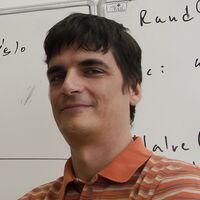I’m at my most inventive when I’m arguing with colleagues

I'd always been drawn to computers and wanted them to form the basis of my career.
Tomáš Brázdil, an associate professor at the Faculty of Informatics, has been collecting various prizes for his work practically from the moment he started his studies. He has one for his outstanding academic record and another for his dissertation; he won an award from the Humboldt Foundation and this spring he received one of the prizes for the best scientists at Masaryk University. Yet initially he didn't even intend to go to university; his route to the Faculty of Informatics was an indirect one, via a vocational school for builders.
Brázdil remembers his complicated path to informatics with a smile. “After the Velvet Revolution my father ran a tow-coupling service for cars. It was expected that I would do my apprenticeship with him and then take over the business when the time was right." Today, however, he is a specialist in the modelling and verification of stochastic systems, i.e. game theory and its application in informatics.
So the father's dream did not come true. On completion of his studies at the vocational school this disobedient son took the maturity examination and applied for university. “I got a bit of grief about it at home, but in the end I was allowed to make my own choice," explains Brázdil, who is now 34 and works at the Institute for Theoretical Computer Science. “I'd always been drawn to computers and wanted them to form the basis of my career."
At the Institute he creates methods and tools that ensure the proper functioning of computer systems and the detecting of errors. His work is abstract: not only does he need no computer system, he doesn't even need a computer, except, he explains, as a word processor. “I create abstract mathematical models, which typically I work out on a whiteboard, calculating their characteristics using algorithms."
No need for a laboratory
The stereotypical scientist works in a laboratory. Brázdil is indeed a scientist, but he can work anywhere – at home, in a café, even, if he so chooses, in the woods. Apparently he makes little use of the options his field can provide. “My preferred way of working is to stand with a colleague at one of our whiteboards, arguing about how to proceed." There is something useful in the methods favoured by the characters of the sitcom The Big Bang Theory, suggests this prizewinning computer scientist.
Like those characters, Brázdil sometimes gets stuck. Asked if this bothers him, he shakes his head. “Not really. It's something I like about this field. The challenge." He explains how a brainteaser might remain unresolved for several years. “Once we gave up on something only to realize after years of work on other things that we now had the tool to solve that particular problem."
Brázdil's current research cooperation with colleagues in Prague is proceeding along similar lines. They are racking their brains over how to develop mathematical methods of game theory for use in various security systems. What will this mean in practice? The research is focused on development of algorithms for unmanned aerial vehicles that patrol airspace, where it is in the owner's interests that no one can predict the direction future movement will take.
Abroad?
Even an award-winning scientist must learn a lot of things as he forges his career. In addition to his work at Masaryk University Brázdil has spent a lot of time abroad in his quest for knowledge. In recent months he has been to Oxford and the Institute of Science and Technology near Vienna; earlier his award from the Humboldt Foundation allowed him to spend a year at the Munich Technical University, perhaps Germany's best university. “At the time I didn't think about how good the school was," remembers Brázdil. “For me the most important thing was that the great professor Javier Esparza worked there." He still likes to recall his time in Munich, even though, as he says himself, he was less than accomplished as a speaker of German.
England, Germany, Austria. After all those stays abroad one could imagine him considering a longer spell away from the Czech Republic. But this Brno computer scientist is planning no such thing. “My wife will not be moved," he explains with a healthy dose of exaggeration, before adding more seriously: “Conditions in Brno are excellent for my family and for my work as a scientist. There's nothing I need that I can't find here."